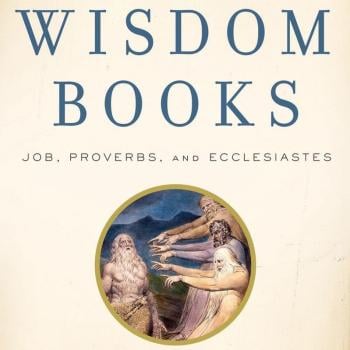“The fool says in his heart, there is no god……”. Whether we are aware of it or not ‘the fool’, like ‘the sluggard’ or ‘the sage/wise man’ are stock characters in early Jewish wisdom literature. They occur for instance in Proverbs, sometimes in personified form (see Prov. 9– Lady Folly), but more often just as a type of person, and some would say a stereotype. It occurred to me that it might be well to rehearse what the Bible says about ‘the fool’, because of course we have lots of modern notions about folly, most of which don’t match up with what the Bible means by a foolish person. For example, we might think today that a fool is a person who has no common sense about the nature of life and ‘how things work in this world’. We might think they are not practical, or ‘good with money’ (‘a fool and his money are soon parted’). In short, we might think it is a person who is not wise in the ways of the world, a person who gets into fights he cannot win, buys things he cannot use, eats foods that are not good for him, drives cars in ways that don’t pay attention to the road and weather conditions and so on. But again, those are all modern notions about folly and foolishness. What does the Bible say about fools?
First of all wise/foolish is a standard dyadic pair in wisdom literature both in the OT and in the NT. That is to say, you cannot entirely understand what makes up the wise person, unless you also understand what constitutes a fool. Take first the parable of Jesus about the wise and foolish builders in Mt. 7.24-27 which climaxes the Sermon on the Mount. Jesus characterizes the wise person as the one who listens to his words and puts them into practice, lives by them. The foolish person then is the one who does not listen and learn from Jesus. Jesus uses a building analogy. Building a life on a wise foundation, namely the foundation of Jesus’ teaching is likened to building a house on rock, and thus on a foundation which can survive the crises of life. Building it on some other foundation has negative consequences when the storms of life show up. And this brings us to an important point. The wise person is a teachable person, a person who does not think they know it all, a person who does not insist on doing it ‘my way’. A wise person is prepared to learn from others, including from a real sage like Jesus (see my book Jesus the Sage). The wise person then is not necessarily a wunderkind, or a genius, or naturally brilliant, or a savant. The wise person may by no means be the most intelligent or brilliant person. The wise person, is the person who takes instruction well, and learns how to live wisely. And it’s important to note that Jesus warns us quite specifically nearer the beginning of the Sermon on the Mount that we must never belittle another person by calling them ‘you fool’ (Mt. 5.22). Notice that that warning comes right after Jesus warning against anger improperly expressed. The word here actually is ‘raca’ which means an empty headed or air-headed person. Here Jesus is talking about caricaturing a person in anger presumably. Elsewhere he is prepared to point out the foolishness of Phariseees and others (Mt. 23.17; 25.3; 7.6). So the issue here is public shaming and name calling presumably.
The wise person in Proverbs is the person who is wise in the ways of God, not necessarily wise in the ways of the world. In Proverbs the beginning of wisdom is said to be revering God, and the Psalmist says that a fool is a person who denies the very existence of God. And yet the wise person is one who knows how to live wisely, and so have long life, good health etc. We need to understand that the maxims or proverbs in Proverbs are generalizations. They are not necessarily true in every particular instance, as becomes clear when you compare Ecclesiastes with Proverbs. Proverbs is speaking into a Biblical cultural situation in which the social situation is basically stable, and the assumption is that living in a wise manner can produce positive fruit of health, long life, even wealth in some cases.
Quite different is what Qoheleth says in Ecclesiastes, and he is speaking into a dysfunctional situation where society does not favor the wise, or the social situation is bad enough that even with wise behavior, it does not always turn out well. Think for example of the difference between the social situation in poverty stricken Sudan, where even with all the wisdom in the world, and all the hard work in the world, a person is exceedingly unlikely to live long and prosper, whereas in a place like America this is much more likely, on average, to happen because the culture and social situation and opportunities are entirely different. In Proverbs we have wisdom for a generally positive cultural situation, in Ecclesiastes we have counter order wisdom in an upside down world, where things are not good in general. Different wisdom for different cultural situations.
If one wants to generalize however, what both the OT and NT speakers call wisdom has to do with what is good and godly in God’s eyes, not in the world’s eyes and estimation. It is Paul who reminds us that the foolishness of God is wiser than the greatest wisdom of human beings (1 Cor. 1). When the world and times are out of joint, God’s wisdom will indeed look like foolishness, just as keeping all of Jesus’ teachings in the Sermon on the Mount, such as non-violence, loving your enemies, turning the other cheek and so on looks today like foolishness to Americans binging on fear and assuming that the solution is to be better armed and prepared to ‘take out’ one’s enemy should he come calling.















